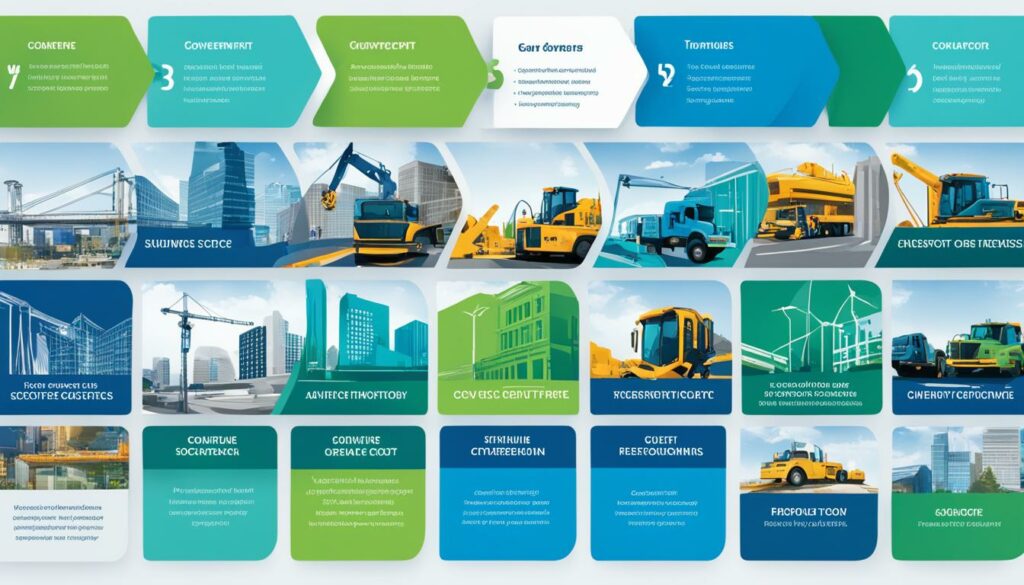The world of government contract jobs has a lot to offer. It gives people the chance to have a steady job. They get paid well and help the government. This field has jobs for everyone, whether you’re new or experienced.
Jobs in government contracts cover many areas. You could work on IT, cybersecurity, health, or engineering projects. Most of these jobs pay well, from $40,000 to over $120,000 a year. And you can find them in many places like Washington DC and Baltimore.
There are many ways to work in government contracts. You might find a full-time job, a contract position, or even start as an intern. These jobs are for all levels, from beginners to seasoned professionals. It’s all about finding what fits with your skills and dreams.
Key Takeaways
- Government contract jobs offer a diverse range of opportunities across various industries and experience levels.
- These roles often come with competitive salaries, ranging from $40,000+ to $120,000+.
- Government contract jobs are available in both on-site and remote/hybrid work arrangements.
- The government contracting landscape includes full-time, contract, temporary, and internship positions.
- Aspiring candidates can explore opportunities at different career stages, from entry-level to director-level roles.
Introduction to Government Contract Jobs
Government contract jobs are positions that let you offer goods or services to the government.1 This includes working for the federal government, state or local levels. Jobs range from tech and healthcare to building and more.
What are Government Contract Jobs?
These are roles where the government hires people or companies to do certain work or give products and services.1 The tasks can be small or big, supporting the government’s work and goals.
Why Pursue a Career in Government Contracting?
The government buys a lot, making it a big customer that needs both small and large products or services.1 Working on government contracts can provide stable jobs, good pay, and the chance to do projects that help everyone. It’s also great for small businesses because there are special opportunities just for them.
10 Government Contract Jobs to Consider
The government contracting sector has many job openings. These include work in tech, healthcare, engineering, and construction.2 The Government Accountability Office (GAO) said $637 billion was spent on government contracts in 2021.
Although we don’t have specific info on 10 jobs, there are many options out there.2 Typically, a government contractor in the U.S. makes about $68,094 a year. In San Francisco, California, this salary bumps up to $102,708 a year. This is 51% more than the national average2.
Government contract jobs vary in experience needed, from starting out to high-level roles.2 There are also special categories for small businesses. This includes groups like Service-Disabled-Veteran Owned and Women-Owned Small Businesses. It helps these companies compete for contracts worth $10,000 to $25,0002.
If you’re considering a job in government contracting, there’s a lot to choose from. Look for a position that matches your skills and goals. With so many opportunities, you can find the right fit for you23.
Qualifications and Skills for Government Contracting
To do well in government contracting, you need a mix of education and skills. The requirements differ based on the job’s level and difficulty. But understanding what you need is key for anyone wanting to work in this area.
Education Requirements
For GS-7 roles, a year of graduate school or a law degree is needed. You also need a year of work like this role at GS-5 level.4 GS-9 jobs need two years of grad school. Or, a grad degree and GS-7 work level for a year.4 To aim for GS-11, you need a Ph.D. or three years of grad school, plus GS-9 level work experience for a year.
4 GS-12 and above jobs require experience at the lower GS level for a year. There’s no specific education needed at this level.4 Positions at GS-13 and up must finish specific training. You need 4 years in contracting or related jobs and 1 year at the next lower level in a specialized role. They also ask for a bachelor’s degree and certain courses.
Specialized Skills and Certifications
To break some education rules, you need approval from the top procurement executive. They look at your skills, work, and other experience to decide.5 It’s good to know important platforms too, like SAM.gov, for signing up, the Acquisition Gateway, and Open Opportunities for learning on the job.
5 Joining groups like Project In Reach can help you learn more about government contracting. Websites like WIFCON and VAO give you important info and training chances.6 It’s also wise to understand the rules on suspension and debarment, and what rights contractors have. This knowledge can help in this field.
The Proposal Writing Process
Starting in the world of7 government contracting means creating proposals that stand out. To do this, you need to know about government requests and how to make strong points. Then, it’s all about working well with everyone involved.
Understanding Government Solicitations
Government groups use detailed plans to find companies that can meet their needs8. These plans might ask for Performance Work Statements (PWS), Statements of Objectives (SOO), or Statements of Work (SOW). They explain what’s needed, how they’ll pick who to work with, and how to send in your proposal.8 Knowing these plans well is key to getting started in7 proposal writing for government jobs.
Developing Compelling Proposals
Getting a government contract needs careful planning and a smart strategy7. Your proposal will be judged on things like how well and how much it costs, and your experience. They look closely at how you plan to do the work, how you’ll manage it, and your quality checks.8 Connecting your proposal to what the government wants, showing you know what you’re doing, gains you more chances to win big contracts.
Coordination and Collaboration
Making a good proposal often takes a whole group working smoothly together7. The people who decide on proposals each look at them alone, without comparing them to others. This makes sure everyone gets a fair chance based on what they offer2>. It’s vital to communicate well, share tasks clearly, and include different viewpoints to make a strong proposal.
Job Search Strategies for Government Contract Positions
Getting a government contract job means being smart about your approach. Building a strong network can help you find opportunities you might miss. The U.S. Small Business Administration works with government agencies to help small businesses connect with federal jobs.9
Networking and Industry Connections
Go to events, join conferences, and become part of associations in government contracting. This will grow your network and let you meet potential bosses. Use your connections, like old friends from work, to hear about new job chances and get recommendations. Informational interviews are also very useful. They give you a peek into the world of government contracts and guide you toward the best jobs to apply for.
Online Job Boards and Recruitment Platforms
Keep an eye on job listings on sites such as LinkedIn, Indeed, and USAJobs.9 Check out the Subcontracting Network for small business opportunities in government contracts and the DSBS for agencies looking for small businesses. Using SAM.gov is great because it shows all federal agency contracts, which is a fantastic place to start.2
Don’t forget to check out tools like the Forecast of Contracting Opportunities and Bidnet. These can help you see when new contracts are coming up and beat the competition by getting your bids in early.92 Stay up to date with the latest government job openings and show you’re a strong candidate by making use of these resources.
Being persistent and taking a proactive stance are crucial in the government job market. Combine strong networking skills with knowledge of the digital tools available for your job search. This mix will lead you to the government contract job that’s right for your career.
Advantages of Working in Government Contracting
Working in government contracting has many perks. It’s great for people who want job security, good pay, and chances to grow. The U.S. government spends more than $650 billion each year on goods and services, which opens up a huge market.10 These contracts often last a long time, giving businesses a stable base for their future plans and investments.10 This work also helps companies build important connections. These connections can bring more business, not just from the government but also from private companies.10 Winning government contracts can lead to bigger and better opportunities in the future.10 Getting a government contract can also boost a business’s financial health. It makes them more attractive to investors and helps them get loans on good terms.10 Plus, many of these projects are for the good of the communities, like making better infrastructures or helping in times of disaster.
Job Security and Stability
Working on government contracts can mean a steady job. You know you have work for a set amount of time, which is often better than in the private sector.11 The work environments in government jobs are known for being stable and following clear rules.11 They also care a lot about work-life balance. You might be able to pick your hours, work from home sometimes, and have lots of time off, especially for parents.
Competitive Compensation and Benefits
In 2022, the federal government spent over $700 billion on contracts. This number is up by about $50 billion from the year before.12 To attract top talent, companies in this field offer good pay and benefits. These include unlimited time off, different kinds of insurance, gym memberships, and money for learning new skills.12 If you work on a contract, how much you’re paid often depends on what the company charges for your work. This way, your pay might be more than what a government worker in a similar role makes.11 Contracts also usually come with good packages that include a salary, health care, retirement plans, vacation time, and much more. This is to make sure they keep smart and skilled people working with them.
Challenges in the Government Contracting Field
In the world of government contracting, many hurdles must be overcome. Although there are chances to make good money, strict rules and fierce competition are big challenges. These can make it hard for companies to win government contracts.2
Stringent Regulations and Compliance
Doing government work means dealing with lots of rules. The Federal Acquisition Regulations (FAR) are just one example. Not following these rules could lead to serious trouble, even jail time.2 Companies have to deal with lots of paperwork and procedures to make sure they’re doing everything right.
Competitive Bidding Process
Getting government contracts isn’t easy. Big companies often fight for the same deals. This can sometimes lead to disagreements and complaints.2 Smaller firms also face a tough challenge but can find chances in contracts reserved for them.
Even with these obstacles, many find the government contracting field rewarding. Those who learn the rules, build special skills, and know how to compete can do very well. It’s all about being prepared and strategic in this mixed but potential-rich arena.
Diverse Sectors for Government Contract Jobs
Government contracting is a big world, full of opportunities in areas like information technology and cybersecurity, healthcare and life sciences, and engineering and construction. In 2021, the U.S. government spent $637 billion on contracts. The main sectors covered were aircraft, food service, software, and healthcare.2
These contract jobs let people with special skills help with the government’s goals and work.
Information Technology and Cybersecurity
The government needs the newest tech and strong cybersecurity. This makes government contract jobs in IT and cybersecurity very important. Jobs range from software development to security consulting.
Competition for these roles is fierce. Sometimes, companies argue over who should have won a contract.2
Healthcare and Life Sciences
Big government healthcare programs need lots of help, from research to managing supplies. Jobs like these in healthcare and life sciences are crucial.2
Contractors in San Francisco tend to earn even more, over 50% more than the national average.2
Engineering and Construction
Key projects, military sites, and government buildings all need the right people. These include architects, project managers, and workers.2
Small businesses can get special contracts, between $10,000 and $25,000 typically.2
In the government contracting world, there are prime contractors and subcontractors. Each has their own duties. The rulebook for these contracts is over 2100 pages long. Breaking these rules can lead to big fines or even being charged with a crime.2
Given the government’s focus on these areas, jobs in government contracts are in high demand. They offer many chances for those who have the skills needed.

Career Advancement in Government Contracting
In the government contracting world, you can grow your career a lot.13 Big names like Lockheed Martin, Booz Allen Hamilton, and Raytheon really invest in their people’s growth. This makes the working atmosphere supportive and team-focused.14
Continuous Learning and Professional Development
Government contracting firms offer lots of chances to learn and develop.12 They have training online, certifications, help with college costs, and plenty of resources to get better at your job.12 It’s a field where they really want you to keep up with the latest and learn more.
Leadership and Management Roles
These days, government contractors need more leaders for their big projects.13 If you’re good at your job in this field, you could move up to manage projects or programs, or give advice as a senior consultant.14 These jobs come with more power, potential for higher pay, and the chance to make big decisions.
What’s cool is, the government contracting area is great at keeping top talent.12 They focus a lot on learning, growing professionally, and offering ways to move up in your career. This makes the place exciting and a good spot for long-term success.
Conclusion
The government contracting sector has many exciting opportunities. You can find government contract jobs, government contracting jobs, and government contracts jobs in different fields. These jobs offer security, good pay, and chances to grow in your career.15
But, working in government contracts also has its tough parts. You must follow strict rules, go through a hard bidding process, and have specific skills. People who do well here know how to write good proposals, understand what the government needs, and follow the rules closely.16
In the end, working in government contracts can be very rewarding. You can have a steady job, opportunities to move up, and help with important government projects. To do well, it’s key to keep learning, develop the right skills, and know how to find the best jobs. This way, you can be successful in this lively and fulfilling field.15


